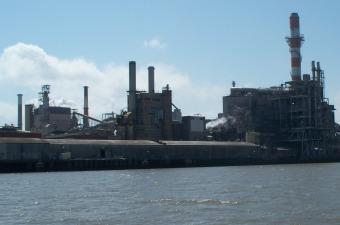
Section Branding
Header Content
EPA Proposes Big Cuts in River Pollution
Primary Content

While carbon cap-and-trade is stalled in Congress, Georgia and South Carolina are moving ahead with a cap-and-trade system that could significantly reduce pollutants in the Savannah River.
Officials at the U.S. Environmental Protection Agency have released proposals for how the system would work.
Basically, they want the states to agree on how much oxygen-depleting pollutants can be put in the river.
Industries and municipal wastewater authorites then could buy and sell rights to pollute.
E.P.A wants the states to choose from three targets.
Savannah Riverkeeper Tonya Bonitatibus, who saw the targets Friday, says she's encouraged by how much the E.P.A. wants to reduce pollution.
"It doesn't matter which target they choose, they're going to be reducing significantly," Bonitatibus says. "The question is, how much."
The targets indicate that even if Georgia and South Carolina agree to the most permissive proposed level, pollution still would be reduced to a third of current levels, from 601,346 lbs. per day of U.O.D. (ultimate oxygen demand) to an estimated 200,000-250,000 lbs./day of U.O.D., the exact amount depending on several factors.
(You can decipher the amounts for yourself. The proposed reductions are specified on page 27 of this document.)
The cap-and-trade system could lead to negotiations between industries and municipal wastewater users.
That could mean millions of dollars flowing between the several dozen industries and municipal wastewater users that pollute.
For instance, if Allendale County, S.C. upgraded its wastewater treatment system, to pollute less, the municipality then could sell its pollution credits to International Paper, a paper mill, so the company doesn't have to reduce its pollution as much as it would without the credits.
The targets, however, don't account for the possibilities of harbor deepening, which would deplete oxygen levels, or drought mitigation efforts, which would reduce flow from upstream dams.
The public has through June to comment to the E.P.A on its proposal.
It'll be up to a panel appointed by the Georgia and South Carolina governors to choose the pollution level target.
It's likely the proposal wouldn't take effect for several years.
Tags: Augusta, Savannah, South Carolina, Savannah River, International Paper, Environmental Protection Agency, water pollution, Thurmond Dam, Savannah Harbor, deepening study, Savannah Riverkeeper, GPB News, Allendale County, Tonia Bonitatibus
